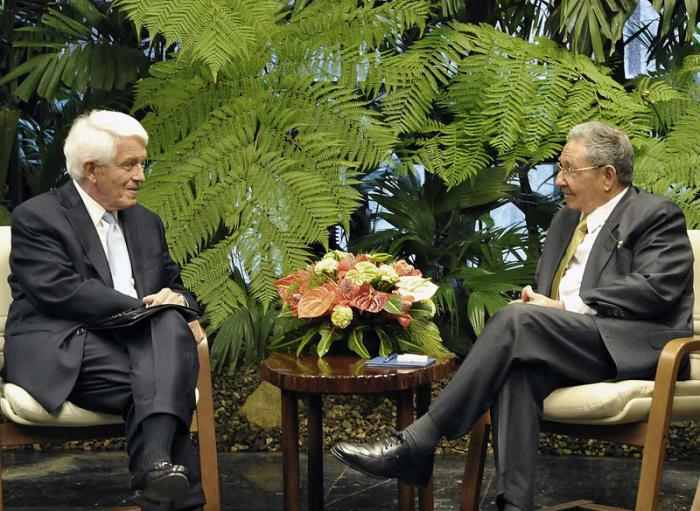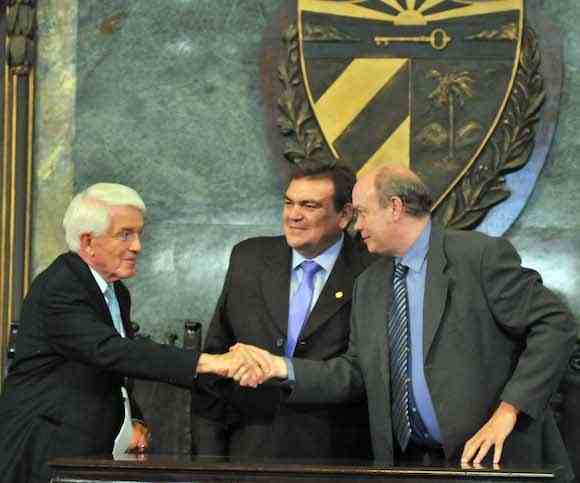
Donohue: ‘We applaud and support your reforms’
MAY 29 – “It is time to begin a new chapter in U.S.-Cuba relations,” said Thomas J. Donohue, president of the U.S. Chamber of Commerce, addressing students, academicians and other guests at the University of Havana on Thursday (May 29).
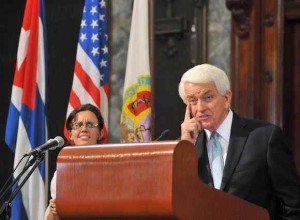 “On the basis of what we’ve seen, we consider that this period of transition in your economic system may possibly be of transition in our policies,” he said, according to the official website Cubadebate. “And it’s very promising for both countries.”
“On the basis of what we’ve seen, we consider that this period of transition in your economic system may possibly be of transition in our policies,” he said, according to the official website Cubadebate. “And it’s very promising for both countries.”
Jorge Hernández Martínez, director of the Center for Hemispheric Studies and the United States, introduced the U.S. visitor with such a glowing biography that Donohue began his address by saying “That sounds like my obituary,” drawing laughter from the audience.
The U.S. visitor spoke to a standing-room-only crowd in the university’s Grand Lecture Hall, a chamber reserved for special events.
“We have come to Cuba to observe the seriousness of [the economic reforms] and to encourage and support them as much as we can,” Donohue said, quoted by The Associated Press. “The entrepreneurial spirit is alive in the citizens.”
“The reforms that we have observed in this country […] can have a positive influence in the lives of its citizens,” he said. “Let us hope that they continue and we encourage them to expand. The businesses in the world economy will surely value that.”
“The more Cuba can do to demonstrate its commitment to the reforms, and the more that can be done to deal with and resolve the conflicts in our relations, the better will be the outlook for changes in the policy of the United States,” he said, quoted by the Reuters news agency.
For many years, U.S.-Cuba relations “have been marked by differences and bound by their past. It doesn’t have to be that way.”
Unrestricted travel between the two countries could give the new generations of Cubans and Americans “an opportunity to know each other, to learn from one another, to do business together, to prosper together and help each other as friends and neighbors,” he said.
Donohue said that he hoped that “other Americans, in addition to Cuban-Americans, could come and convince themselves of how much we share.”
While citing China and Vietnam as examples of communist governments that have adopted market-oriented economies, Donohue stressed the value of private enterprise.
“We’re profoundly convinced that the countries with strong private sectors […] will have the most successful and productive economies,” he said.
The U.S. Chamber of Commerce has been an aggressive defender of normal relations between Havana and Washington, Donohue said, adding that “there are some very good business on the island worth investing in.”
About the trade embargo the U.S. imposed on Cuba decades ago, “the Chamber of Commerce thinks that it is time to eliminate the longstanding political barriers.”
“Cuba is safe for investment, not only for the citizens of the United States — we’re 90 miles apart — but also for the entire world, taking into account the changes that are taking place,” Donohue said.
Asked how much longer the embargo might last, he answered, “It depends on how well we can communicate with one another.”
Donohue and about a dozen U.S. businessmen arrived in Cuba on Tuesday. Since then, they have visited at least one cooperative and toured the Development Zone at the Port of Mariel. They have also met with several self-employed entrepreneurs.
Cuban TV’s Thursday night newscast showed images of a meeting between Donohue and President Raúl Castro.
“We talked about steps forward that might be taken by both countries” to improve U.S. Cuba relations, Donohue said as the 12-member delegation prepared to board a private plane back to the U.S. at the end of its three-day visit.
“It was positive and we expect to talk again,” Donohue said of his meeting with Castro.
(Photo above is of Donohue shaking hands with Rodrigo Malmierca, minister of Foreign Trade and Investment, the man in the middle is the dean of the University, Gustavo Cobreiro Suarez. Photos by Ricardo López Hevia from the Cuban daily Granma.)
*****
Chamber president tours cooperative, questions workers
MAY 28 – Thomas J. Donohue, president of the U.S. Chamber of Commerce, on Wednesday visited an automotive repair cooperative in Havana, where he maintained a “fluid” chat with the workers, Radio Habana reported.
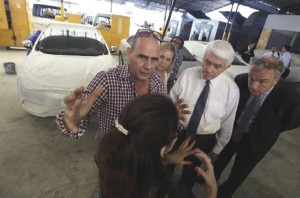
“[Donohue] was interested in the ‘before and after’ of this enterprise […] about how workers are hired and protected,” said Marcelo González, manager of the Vehicle Reconstruction Cooperative in the Cerro municipality of Havana.
As part of its economic reforms, the government last year authorized the operation of trades and services cooperatives as complements to the state-run enterprises. In the past it allowed only agricultural cooperatives.
The government says that the number of nonagricultural cooperatives is about 450.
The auto repair cooperative visited by Donohue and members of his entourage was created 10 months ago, according to Radio Habana. It has 58 partners, whose income is reportedly in the $300-dollar-a-month range.
The cooperative system “gives us the freedom to manage ourselves, which allows us to increase our work volume and make decisions about our own resources,” González told The Associated Press. Since the cooperative’s launching, “productivity has increased a lot,” he said.
The Reuters news agency quoted Donohue as saying that “I have been free to go wherever I wanted. I’m talking with people in the private sector and the public sector. We’re going to meet with small businessmen. We are meeting with people from other countries who are operating here. I believe we’re going to have a fair look around and are enjoying ourselves.”
Donohue, a champion of capitalism and free enterprise, has opposed for years the trade embargo the U.S. has imposed on Cuba (which the Cubans call “blockade”) saying that it runs counter to his country’s commercial interests.
Washington and Havana broke diplomatic relations in the early 1960s. The trade embargo was imposed 52 years ago. An exception to the embargo allows Cuba to buy some food and agricultural products from the U.S. Those purchases totaled $509 million in 2012.
*****
U.S. Chamber of Commerce execs arrive in Havana
MAY 27 – A delegation from the U.S. Chamber of Commerce arrived Tuesday afternoon in Havana, led by its chief executive officer, Thomas J. Donohue; Steve Van Andel, chairman of the Chamber’s board of directors and president of the Amway corporation; and Marcel Smits, executive vice president and financial director of the Cargill corporation, the daily Granma reported.
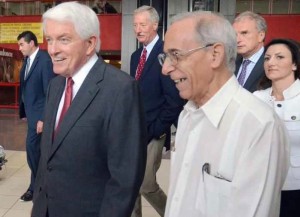
After their arrival, they met with Cuban Foreign Minister Bruno Rodríguez Parrilla and Rodrigo Malmierca Díaz, minister of Foreign Trade and Foreign Investment.
According to Granma, “during their stay in Cuba, they will conduct other meetings and visit places of interest connected mainly with the process of actualization of our economic model.”
In a statement posted on the Chamber’s website, Donohue wrote that the “trip will provide us with a first-hand look at changes in Cuba’s economic policies and whether or not they are affecting the ability to do business there.”
“We want to learn more about these reforms, determine if they have brought about real and lasting changes, and find ways to encourage Cuba’s budding private sector,” Donohue stated. “We will report our findings to lawmakers, our members, and the American business community.”
The Chamber describes itself as “the world’s largest business federation representing the interests of more than 3 million businesses of all sizes, sectors, and regions, as well as state and local chambers and industry associations.”


